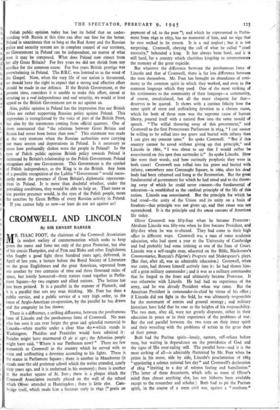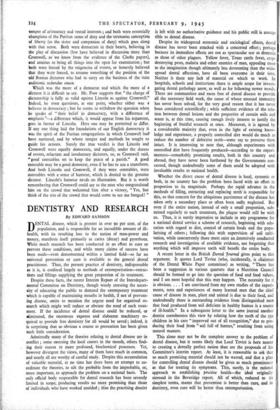CROMWELL AND LINCOLN
By SIR ERNEST BARKER
MR. ISAAC FOOT, the chairman of the Cromwell Association (a modest society of commemoration which seeks to keep green the name and fame not only of the great Protector, but also of his cousin Hampden, and of Pym and Blake and other Englishmen who fought a good fight three hundred years ago), delivered, in April of last year, a lecture before the Royal Society of Literature on the great Englishman and the great American, separated from one another by two centuries of time and three thousand miles of space, but jointly honoured—their statues stand together in Parliament Square—by two cognate and allied nations. The lecture has just been printed. It is a parallel in the manner of Plutarch, and it is a parallel that sets any man thinking. Mr.. Foot has done a public service, and a public service of a very high order, to the cause of Apglo-American co-operation, by the parallel he has drawn and the congruity he has shown.
There is a difference, a striking difference, between the posthumous fame of Lincoln and the posthumous fame of Cromwell. No man who has seen it can ever forget the great and splendid memorial to Lincoln—white marble under a clear blue sky--which stands in Washington. Pheidias and Praxiteles would have admired it : Pericles might have murmured 0 sic si ego ; the Athenian people might have said, "Where is our Parthenon now?" There are few memorials to Cromwell in the country which he served with so stern and unflinching a devotion according to his lights. There is the statue in Parliament Square ; there is another in Manchester (it stands near the old grainmar school which the writer attended, nearly sixty years ago, and it is enshrined in his memory) ; there is another in the market square of St. Ives ; there is a plaque Which the Cromwell Association recently placed on the wall of the school which Oliver attended at Huntingdon ; there is little else. Cambridge itself, which made him a freeman early in 1640 (" gratis on
payment of id. to the poor "), and which he represented in Parliament from 1640 to 1653, has no memorial of him, and no sign that he ever walked in its streets. It is a sad neglect ; but it is not surprising. Cromwell, obeying the call of what he called "cruel necessity," beheaded a king. It has always been hard, and it is still hard, for a country which cherishes kingship to commemorate the memory of the great regicide.
But whatever the difference between the posthumous fame of Lincoln and that of Cromwell, there is far less difference between the men themselves. Mr. Foot has brought an abundance of testimony to the common spirit in which they worked, and even to the common language which they used. One of the most striking of his testimonies to the community of their language—a community, of course, uncalculated, but all the more eloquent for that— deserves to be quoted. It shows with a curious felicity how the same spirit of stern and unflinching devotion to a chosen cause, which for both of these men was the supreme cause of human liberty, poured itself with a natural flow into the same mould of speech. "The wilful throwing away of this government," said Cromwell to the first Protectorate Parliament in 1654, "1 can sooner be willing to be rolled into my grave and buried with infamy than I can give my consent unto." So spake Cromwell. "But if this country cannot be saved without giving up that principle," said Lincoln in 1861, "I was about to say that I would rather be assassinated on this spot than surrender it." So spake Lincoln. How like were their words, and how curiously prophetic they were in both cases! Cromwell was rolled into his grave and buried with infamy, somewhere near Connaught Square, in 166o, after his dead body had been exhumed and hung at the Restoration. But the great fundamental of government for which he had stood and to the throwing away of which he could never consent—the fundamental of toleration—is established as the cardinal principle of the life of this nation. Lincoln was assassinated. But the principle for which he had stood—the unity of the Union and its unity on a basis of freedom—that principle was not given up, and that cause was not surrendered. It is the principle and the cause causans of American life today.
Oliver Cromwell was fifty-four when he became Protector: Abraham Lincoln was fifty-one when he first became President, and fifty-five when he was re-elected. They had come to their high office in different ways. Cromwell was a man of some academic education, who had spent a year at the University of Cambridge and had probably had some training at one of the Inns of Court. Lincoln was a self-taught man, educated on the Bible, Blackstone's Commentaries, Bunyan's Pilgrim's Progress and Shakespeare's plays. (But that, after all, was an admirable education.) Cromwell, when war came, had thrown himself actively into it: he had shown himself a great military commander ; and it was as a military commander that he forged to the front and ultimately became Protector. It was otherwise with Lincoln. He had had no experience of the army, and he was already President when war came. But the American President is commander-in-chief by virtue of his office ; if Lincoln did not fight in the field, he was ultimately responsible for the movement of armies and general strategy ; and military historians have held that he rose to the heights of his responsibility. The two men, after all, were not greatly disparate, either in their education in peace or in their experience of the problems of war. But the real parallel between the two rests on their inner spirit and their wrestling with the problems of action in the great days of their power.
Both had the Puritan spirit—lonely, austere, self-reliant before men, but waiting in dependence on the providence of God and the signs of His over-ruling will. The parallel here—and it is the most striking of all—is admirably illustrated by Mr. Foot when he prints in his notes, side by side, Lincoln's proclamation of 1863 "appointing a solemn national fast day" and Cromwell's declaration of 1654 "inviting to a day of solemn fasting and humiliation." (The latter of these documents, which tells us more of Oliver's mind than almost anything else, has not hitherto been available except to the researcher and scholar.) Both had to pit the Puritan spirit, in the course of a stern civil war, against a "southern"
temper of aristocracy and vested interests ; and both were essentially champions of the Puritan sense of duty and the strenuous conception of liberty (as the sister and companion of duty) which goes along with that sense. Both were democrats in their hearts, believing in the play of discussion (few have believed in discussion more than Cromwell, as we know from the evidence of the Clarke papers), and anxious to bring all things into the open for examination ; but both were forced by the exigencies of events, or honestly believed that they were forced, to assume something of the position of the old Roman dictators who had to carry on the business of the state seditionis sedandae causa.
Which was the more of a democrat and which the more of a dictator it is difficult to say. Mr. Foot suggests that "the charge of dictatorship is fully as valid against Lincoln as against Cromwell." Indeed, he even questions, at one point, whether either was a believer in democracy ; but he seems to withdraw the question when he speaks of "their belief in democracy, with a difference of emphasis "—a difference which, it would appear from his argument, goes in favour of Lincoln. Here one may be permitted to differ. If any one thing laid the foundations of our English democracy it was the spirit of the Puritan congregations in which Cromwell had' been nurtured, and by whose temper and methods he sought to guide his actions. Surely the true verdict is that Lincoln and Cromwell were equally democrats, and equally, under the duress of events, reluctant and involuntary dictators, or, as Cromwell said, "good constables set to keep the peace of a parish." A good constable may be a good democrat, even if he has to use a truncheon. And both Lincoln and Cromwell, if they were constables, were constables with a sense of humour, which is denied to the genuine dictator. Lincoln's humour needs no illustration. But it is worth remembering that Cromwell could say to the man who congratulated him on the crowd that welcomed him after a victory, "Yes, but think of the size of the crowd that would come to see me hanged! "























 Previous page
Previous page